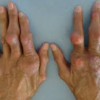Understanding Tourette Syndrome and the Role of Ayurveda in Its Management
Understanding Tourette Syndrome and the Role of Ayurveda in Its Management is a neurological disorder characterized by repetitive, involuntary movements and vocalizations called tics. While the exact cause of TS remains unclear, it is believed to involve genetic, environmental, and neurobiological factors. Affected individuals may experience a range of symptoms that can vary in severity and may impact daily functioning and quality of life.
In recent years, there has been a growing interest in alternative and complementary approaches to managing Tourette Syndrome, including Ayurvedic medicine. Ayurveda, a traditional system of medicine originating in India, emphasizes a holistic approach to health and wellness. This blog explores Tourette Syndrome, its symptoms, and how Ayurveda may offer supportive strategies for managing the condition.
Understanding Tourette Syndrome

Symptoms of Tourette Syndrome
Tourette Syndrome manifests through two primary types of tics: motor tics and vocal tics.
- Motor Tics: These are involuntary movements that can include eye blinking, head jerking, shoulder shrugging, or other repetitive motions. Motor tics can be simple (e.g., blinking) or complex (e.g., jumping or touching objects).
- Vocal Tics: These involve involuntary sounds produced by the throat, which can range from simple noises like throat clearing to complex utterances, including words or phrases. Some individuals may also exhibit coprolalia, which is the involuntary utterance of inappropriate or offensive words.
Tics typically begin in childhood, often between the ages of 5 and 10. While they may fluctuate in intensity, many children experience a reduction in symptoms as they enter adolescence or adulthood.
Impact on Daily Life
While the physical symptoms of TS are notable, the condition can significantly impact social, emotional, and psychological well-being. Children and adults with TS may experience:
- Social Challenges: Tics can draw unwanted attention, leading to bullying or social isolation.
- Emotional Distress: The awareness of tics and their consequences can lead to anxiety, depression, or low self-esteem.
- Co-occurring Conditions: Many individuals with TS also experience other conditions such as Attention Deficit Hyperactivity Disorder (ADHD) and Obsessive-Compulsive Disorder (OCD), complicating their overall management.
The Ayurvedic Perspective
Ayurveda views health as a balance between body, mind, and spirit. It emphasizes the importance of individualized treatment plans based on a person’s unique constitution, or prakriti.
The Doshas
Ayurvedic medicine is based on the concept of three doshas: Vata, Pitta, and Kapha. These doshas represent different combinations of the five elements (earth, water, fire, air, and ether) and are believed to govern various physiological and psychological functions.
- Vata: Associated with movement and communication; it can influence the nervous system.
- Pitta: Linked to metabolism and transformation; it governs digestion and heat.
- Kapha: Represents stability and structure; it influences growth and immunity.
In Ayurveda, an imbalance in these doshas may contribute to the manifestation of various health issues, including neurological disorders like TS.
Ayurvedic Treatments for Tourette Syndrome
While there is no cure for Tourette Syndrome, Ayurveda offers several therapeutic modalities that may help alleviate symptoms and improve quality of life. Here are some Ayurvedic approaches that may be beneficial for individuals with TS:
1. Diet and Nutrition
Ayurveda emphasizes the importance of a balanced diet tailored to an individual’s dosha. Nutritional choices can impact neurological health and overall well-being.
- Vata Balancing Foods: For individuals with a Vata imbalance, incorporating warm, moist, and nourishing foods can be beneficial. Examples include cooked grains, nuts, dairy products, and root vegetables.
- Avoiding Stimulants: Limiting caffeine, sugar, and highly processed foods can help reduce anxiety and agitation, potentially lessening the frequency of tics.
2. Herbal Remedies
Ayurvedic herbs are often used to support neurological function and overall health. Some herbs that may be beneficial for managing symptoms of TS include:
- Brahmi (Bacopa monnieri): Known for its calming effects on the nervous system and potential cognitive-enhancing properties.
- Ashwagandha (Withania somnifera): An adaptogen that may help reduce stress and anxiety.
- Turmeric (Curcuma longa): Contains curcumin, which has anti-inflammatory and neuroprotective properties.
It is essential to consult with an Ayurvedic practitioner to determine the appropriate herbal formulations and dosages based on individual needs.
3. Panchakarma Detoxification
Panchakarma is a detoxification process in Ayurveda that aims to cleanse the body of accumulated toxins (ama). This process can help restore balance and may be particularly beneficial for individuals with neurological disorders.
Panchakarma treatments may include:
- Abhyanga: A therapeutic oil massage that promotes relaxation and improves circulation.
- Shirodhara: A soothing treatment involving the pouring of warm oil on the forehead, which can help calm the mind and reduce anxiety.
4. Yoga and Meditation
Mind-body practices like yoga and meditation are integral to Ayurveda. These practices can help reduce stress, enhance relaxation, and improve emotional regulation.
- Yoga: Certain yoga asanas (postures) may help release physical tension and promote a sense of calm.
- Meditation: Mindfulness meditation can assist individuals in managing anxiety and developing greater awareness of their tics.
Lifestyle Modifications
In addition to dietary changes and herbal remedies, certain lifestyle modifications can support individuals with Tourette Syndrome:
- Routine Establishment: Maintaining a consistent daily routine can help reduce anxiety and stress.
- Stress Management: Techniques such as deep breathing, progressive muscle relaxation, and mindfulness can assist in managing triggers that may exacerbate tics.
- Sleep Hygiene: Prioritizing quality sleep is essential for overall health and can significantly impact symptom management.
The Importance of a Holistic Approach
Ayurveda’s holistic philosophy aligns well with the complexities of Tourette Syndrome. Rather than solely focusing on symptom management, Ayurveda encourages individuals to explore underlying imbalances in their physical, mental, and emotional health.
By addressing the whole person, Ayurveda can help enhance resilience, improve quality of life, and promote overall well-being.
Working with Healthcare Professionals
While Ayurvedic practices can provide valuable support, it is crucial for individuals with Tourette Syndrome to work closely with healthcare professionals. This collaborative approach ensures that all aspects of care are addressed, including medical treatments and psychological support.
Conclusion
Tourette Syndrome is a complex neurological condition that can significantly impact individuals and their families. While there is no one-size-fits-all solution, Ayurveda offers a holistic framework for managing symptoms and promoting overall well-being. Through a combination of dietary adjustments, herbal remedies, detoxification, and lifestyle modifications, individuals with TS may find relief and improved quality of life.
As always, it is important to consult with qualified Ayurvedic practitioners and healthcare providers to tailor treatment plans that address individual needs and circumstances. Embracing a comprehensive approach that honors both traditional wisdom and modern medical insights can pave the way for a healthier, more balanced life.








Leave a reply